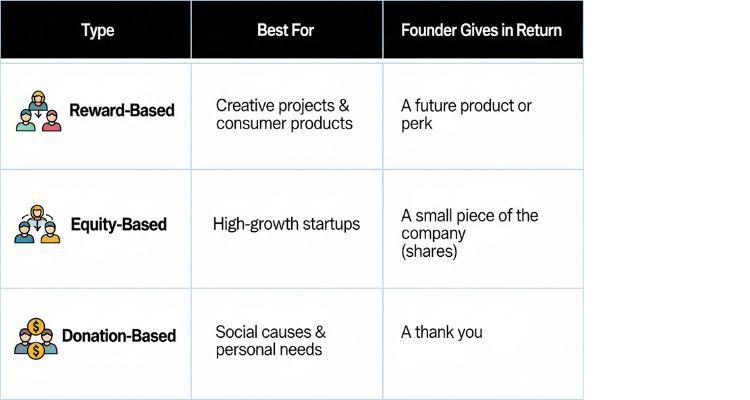Looking for startup capital without giving up control? These 7 funding strategies, from bootstrapping to microloans, can get your business off the ground faster and smarter.
Introduction: The real story of startup funding
If you think you need millions from a Venture Capitalist to get started, you’ve already bought into the biggest myth in the startup world. While headlines celebrate huge VC deals, the reality is that less than 1% of all startups ever receive that kind of funding. (Source: Fundera).
So, how do most businesses get off the ground?
- About 38% get their initial cash from friends and family. (Source: SCORE)
- The average microloan is around $13,000—often more than enough to turn a great idea into a real business. (Source: U.S. Small Business Administration)
Startup funding is far more creative and accessible than most founders realize. Forget the myths. Let’s explore seven powerful, often-overlooked funding options that can give your business the fuel it needs to succeed.
1. Bootstrapping: The power of self-funding
Bootstrapping is the art of funding your business entirely on your own, using personal savings or the revenue it generates. The biggest advantage is maintaining 100% control of your company; every decision is yours, and so are all the profits. This approach is particularly well-suited for founders who can start small, have a clear path to generating revenue quickly, and want to scale their expenses as they grow.

How to apply it:
- Start with a Minimum Viable Product (MVP). Build the simplest version of your product to start generating sales.
- Keep your day job. Use your salary to fund the business in the early stages to reduce personal financial risk.
- Focus on cash flow. Manage your expenses obsessively and reinvest every dollar of profit back into the business.
2. Friends and Family: your first believers
This common approach involves raising money from people you know personally. Because your friends and family invest based on their belief in you, the terms are often more flexible, and the process is much faster. This route is a strong fit for founders who have a trusted personal network and need seed capital to build a prototype or validate an idea before approaching formal investors. The average investment of around $23,000 can be a game-changer.
How to apply it:
- Treat it like a real investment. Don’t rely on a handshake. Create a formal agreement that clearly states whether the money is a loan or an equity investment.
- Be honest about the risks. Make sure they understand that startups are risky and they could lose their entire investment.
- Provide regular updates. Keep them informed about your progress, both good and bad. This maintains trust and shows respect for their support.
3. Crowdfunding: let your customers fund you
Crowdfunding platforms allow you to raise small amounts of money from a large number of people online.3 This method is incredibly powerful because it both raises money and proves there is real market demand before you launch. It’s an ideal fit for entrepreneurs with a compelling consumer product, a knack for storytelling, and a need to validate their market before mass production. For instance, Sarah, a baker in Ohio, launched her gluten-free cookie brand with a $20,000 campaign on Kickstarter and used the momentum to get her first products onto local grocery store shelves within a year.
There are three main types:
- Reward-Based (e.g., Kickstarter, Indiegogo): You offer backers a “reward,” usually the product you’re creating.
- Equity-Based (e.g., StartEngine, Republic): You sell a small piece of ownership (equity) in your company.
- Donation-Based (e.g., GoFundMe): People give money simply to support your cause.

4. Microloans: small loans, big impact
Microloans are very small loans, typically under $50,000, offered by non-profits or government-backed programs.4 They fill a critical gap left by traditional banks, which often won’t lend to new businesses. This makes them a great option for founders who have been rejected by banks or only need a small amount of capital for things like equipment or inventory, all without giving up any ownership.
How to apply it:
- Find an SBA Intermediary. The U.S. Small Business Administration (SBA) works with a network of community-based lenders. You can find a list on the official SBA Microlender Search Page.
- Prepare your documents. You will still need a solid business plan and a clear explanation of how you will use the funds.
- Show your character. Microlenders often place a strong emphasis on the founder’s character and commitment, not just their credit score.
5. Grants & Competitions: funding you don’t pay back
Grants are non-repayable funds from governments or foundations, while competitions offer prize money to promising businesses. This is essentially “free money” that also provides incredible validation and PR for your startup. Consider this path if your business has a social, environmental, or scientific mission, or if you belong to a specific demographic, a grant is designed to support.
How to apply it:
- Search for opportunities. Check government sites like the official Grants.gov portal, and look for competitions hosted by universities or large corporations in your industry.
- Read the eligibility criteria carefully. Grant applications are time-consuming, so make sure you are a perfect fit before you start writing.
- Focus on the story. Grant committees and judges want to see your passion and understand the impact your business will have.

6. Revenue-Based Financing (RBF): For businesses with sales
Revenue-Based Financing is a model where a firm gives you cash, which you then pay back as a small percentage of your monthly revenue. The flexible payments are tied to your performance, and you don’t have to give up any equity. This model is built for businesses with consistent, predictable revenue, such as a subscription service or e-commerce store, that need growth capital for marketing or inventory.
7. Incubators and Accelerators: funding plus mentorship
These programs provide funding, mentorship, and resources in exchange for a small amount of equity (typically 5-10%). The true value goes far beyond the cash; you get access to a network of mentors, investors, and fellow founders. An accelerator is an excellent choice for founders building a high-growth, scalable business who would benefit from intense guidance and are willing to trade a small amount of equity for a massive head start.
Famous examples include Y Combinator, Techstars, and 500 Global.

Final thoughts
The path to funding a startup is not a one-size-fits-all journey. While venture capital gets all the headlines, it’s a path meant for a tiny fraction of businesses. The smartest founders are the ones who understand all the tools available to them. To begin organizing your vision, you can start with a professional Business Plan Template.
Ready to fund your dream? Start by building your MVP, exploring microloans, or sharing your story on Kickstarter. The money is out there—and so is your opportunity.
“The job is not to find the right customers for your product, but to find the right products for your customers.” – Philip Kotler
This idea applies to funding, too. The job is not just to find any money, but to find the right kind of money for your business.
Frequently Asked Questions (FAQs)
- What is the easiest funding to get?
For most founders, personal savings (bootstrapping) and loans from friends and family are the most accessible and easiest to secure because they are based on trust. - Can I combine different funding types?
Absolutely. Many successful startups use a mix of funding. For example, you might use a microloan to buy initial equipment and then launch a Kickstarter campaign to fund your first production run. - How much equity should I give up?
It depends on the stage of your business and the source of funding. For early-stage accelerator programs, 5-10% is common. For individual angel investors or equity crowdfunding, it can vary widely based on your company’s valuation. Always seek legal advice before giving up equity.
References
- Startup Failure Rate Statistics. (2025). DesignRush. https://www.designrush.com/agency/business-consulting/trends/startup-failure-rate-statistics
- Microloans. (n.d.). U.S. Small Business Administration. https://www.sba.gov/funding-programs/loans/microloans
- Pros and Cons of Raising Money from Friends and Family. (2025). Qubit Capital. https://qubit.capital/blog/friends-family-funding-pros-cons
- Types of Investors – Friends & Family, Angels, VCs, and Customers. (n.d.). Fundable. https://www.fundable.com/learn/resources/guides/investor/types-of-investors
- Crowdfunding Statistics: Market Size and Growth. (2023). Fundera. https://www.fundera.com/resources/crowdfunding-statistics

